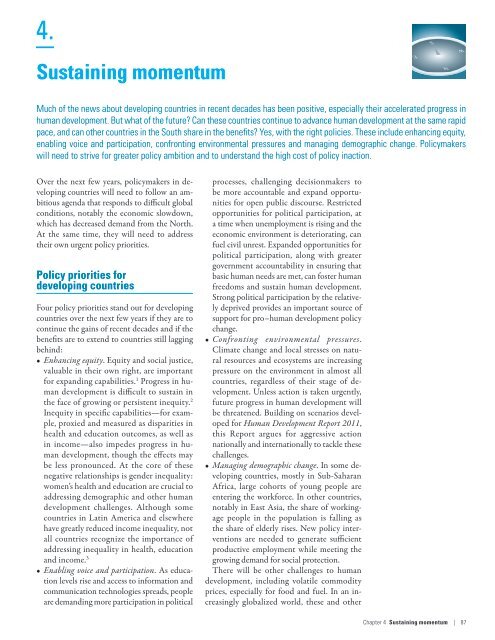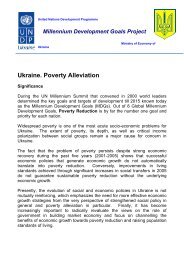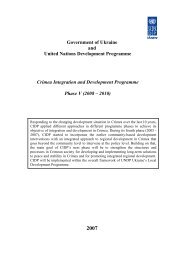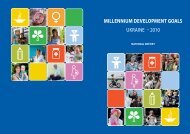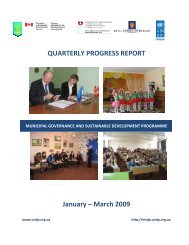E N S W - United Nations Development Programme
E N S W - United Nations Development Programme
E N S W - United Nations Development Programme
You also want an ePaper? Increase the reach of your titles
YUMPU automatically turns print PDFs into web optimized ePapers that Google loves.
4.<br />
Sustaining momentum<br />
Much of the news about developing countries in recent decades has been positive, especially their accelerated progress in<br />
human development. But what of the future Can these countries continue to advance human development at the same rapid<br />
pace, and can other countries in the South share in the benefits Yes, with the right policies. These include enhancing equity,<br />
enabling voice and participation, confronting environmental pressures and managing demographic change. Policymakers<br />
will need to strive for greater policy ambition and to understand the high cost of policy inaction.<br />
Over the next few years, policymakers in developing<br />
countries will need to follow an ambitious<br />
agenda that responds to difficult global<br />
conditions, notably the economic slowdown,<br />
which has decreased demand from the North.<br />
At the same time, they will need to address<br />
their own urgent policy priorities.<br />
Policy priorities for<br />
developing countries<br />
Four policy priorities stand out for developing<br />
countries over the next few years if they are to<br />
continue the gains of recent decades and if the<br />
benefits are to extend to countries still lagging<br />
behind:<br />
• Enhancing equity. Equity and social justice,<br />
valuable in their own right, are important<br />
for expanding capabilities. 1 Progress in human<br />
development is difficult to sustain in<br />
the face of growing or persistent inequity. 2<br />
Inequity in specific capabilities—for example,<br />
proxied and measured as disparities in<br />
health and education outcomes, as well as<br />
in income—also impedes progress in human<br />
development, though the effects may<br />
be less pronounced. At the core of these<br />
negative relationships is gender inequality:<br />
women’s health and education are crucial to<br />
addressing demographic and other human<br />
development challenges. Although some<br />
countries in Latin America and elsewhere<br />
have greatly reduced income inequality, not<br />
all countries recognize the importance of<br />
addressing inequality in health, education<br />
and income. 3<br />
• Enabling voice and participation. As education<br />
levels rise and access to information and<br />
communication technologies spreads, people<br />
are demanding more participation in political<br />
processes, challenging decisionmakers to<br />
be more accountable and expand opportunities<br />
for open public discourse. Restricted<br />
opportunities for political participation, at<br />
a time when unemployment is rising and the<br />
economic environment is deteriorating, can<br />
fuel civil unrest. Expanded opportunities for<br />
political participation, along with greater<br />
government accountability in ensuring that<br />
basic human needs are met, can foster human<br />
freedoms and sustain human development.<br />
Strong political participation by the relatively<br />
deprived provides an important source of<br />
support for pro–human development policy<br />
change.<br />
• Confronting environmental pressures.<br />
Climate change and local stresses on natural<br />
resources and ecosystems are increasing<br />
pressure on the environment in almost all<br />
countries, regardless of their stage of development.<br />
Unless action is taken urgently,<br />
future progress in human development will<br />
be threatened. Building on scenarios developed<br />
for Human <strong>Development</strong> Report 2011,<br />
this Report argues for aggressive action<br />
nationally and internationally to tackle these<br />
challenges.<br />
• Managing demographic change. In some developing<br />
countries, mostly in Sub-Saharan<br />
Africa, large cohorts of young people are<br />
entering the workforce. In other countries,<br />
notably in East Asia, the share of workingage<br />
people in the population is falling as<br />
the share of elderly rises. New policy interventions<br />
are needed to generate sufficient<br />
productive employment while meeting the<br />
growing demand for social protection.<br />
There will be other challenges to human<br />
development, including volatile commodity<br />
prices, especially for food and fuel. In an increasingly<br />
globalized world, these and other<br />
Chapter 4 Sustaining momentum | 87


